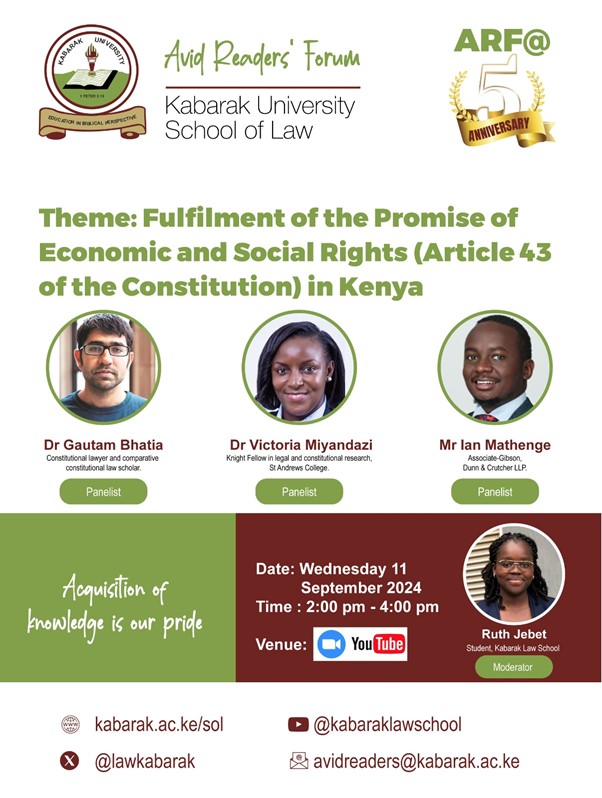The Avid Readers Forum held a significant webinar on 11 September 2024 focused on fulfilling economic and social rights as outlined in Article 43 of the Kenyan Constitution. The panel featured distinguished experts: Dr Gautam Bhatia, a renowned constitutional lawyer and comparative constitutional scholar; Dr Victoria Miyandazi, a constitutional researcher from St Andrews University; Dr Jill Ghai, co-founder of the Katiba Institute and an advocate in education, gender studies, and human rights; and Mr Ian Mathenge, an associate at Gibson, Dunn & Crutcher LLP. Ruth Jebet, a law student at Kabarak Law School, moderated the discussion.
Dr Victoria Miyandazi initiated the discussion by contextualising socio-economic rights in Kenya, reflecting on historical inequalities where development was concentrated among those in power. She discussed how these inequalities prompted the inclusion of socio-economic rights in the 2010 Constitution, framing law as a tool for emancipation. Dr Miyandazi highlighted the courts' role in implementing Article 43, noting their focus on positive duties rather than the state s negative obligations.
 Mr Mathenge analysed the challenges faced in implementing socio-economic rights, attributing many issues to government projects driven by personal or political motives rather than genuine needs. He categorised approaches to fulfilling these rights into economic, socio-political, and human rights-based approaches. He critiqued policies like the Affordable Housing Fund and New Education Funding MODeL for neglecting human rights in favour of legacy projects. He stressed the importance of Article 10(b) of the Constitution, which mandates state officers to uphold national values and human rights in policy-making.
Mr Mathenge analysed the challenges faced in implementing socio-economic rights, attributing many issues to government projects driven by personal or political motives rather than genuine needs. He categorised approaches to fulfilling these rights into economic, socio-political, and human rights-based approaches. He critiqued policies like the Affordable Housing Fund and New Education Funding MODeL for neglecting human rights in favour of legacy projects. He stressed the importance of Article 10(b) of the Constitution, which mandates state officers to uphold national values and human rights in policy-making.
Dr Gautam Bhatia focused on the right to housing and land issues, particularly through the lens of the Mitu-Bell, Satross Ayuma and Musembi decisions. He praised the courts for addressing procedural issues related to eviction but disapproved of their reluctance to tackle broader historical injustices related to landlessness. Bhatia explored historical land ownership regimes and their impact on current land issues, linking these to the push for a new constitution.
Dr Jill Ghai discussed gaps in implementing health rights, particularly mental health, criticising the government for failing to adopt a human rights-based approach. She highlighted poor planning and inadequate public engagement and urged mass education on progressive realisation. Dr Ghai emphasised that both institutions and the public need to understand the jurisprudence around Article 43 and align with international standards of accessibility, affordability, adaptability, and quality (the 3A s + Q).
The audience actively participated, raising concerns such as Kenya's readiness for an equality and non-discrimination bill. Arising from the audience s question, Dr Miyandazi affirmed Kenya s readiness and proposed that the Katiba Institute draft an equality bill with substantive provisions. Another concern was the role of courts in ensuring compliance with Article 43 orders. The discussants noted that the Mitu-Bell case set a precedent in how courts can intervene in ensuring the full realization of socio-economic rights by the use of emerging remedies like structural/supervisory interdicts. Mr. Mathenge suggested that courts should adopt a more inquisitorial approach to ensure compliance, while also acknowledging the limitations of judicial interventions.
The discussants concluded that addressing the implementation of socio-economic rights in Kenya requires a comprehensive approach involving public engagement and the active participation of the Judiciary and Executive branches of government. They agreed that a human rights-based approach, emphasising the protection and promotion of human rights, is essential for social justice, development, and governance. Additionally, it was mentioned that enhancing public awareness of Article 43, strengthening the courts' role in progressive realisation, and utilising remedies like structural interdicts are crucial steps. Lastly, one of the discussants noted that the involvement of Parliament in legislation and oversight will be vital in fulfilling the promises of Article 43 and advancing socio-economic rights. The session was genuinely timely, enjoyable, and enriching.


